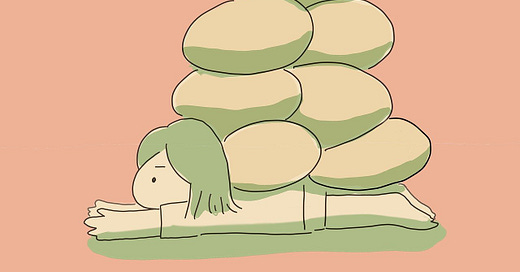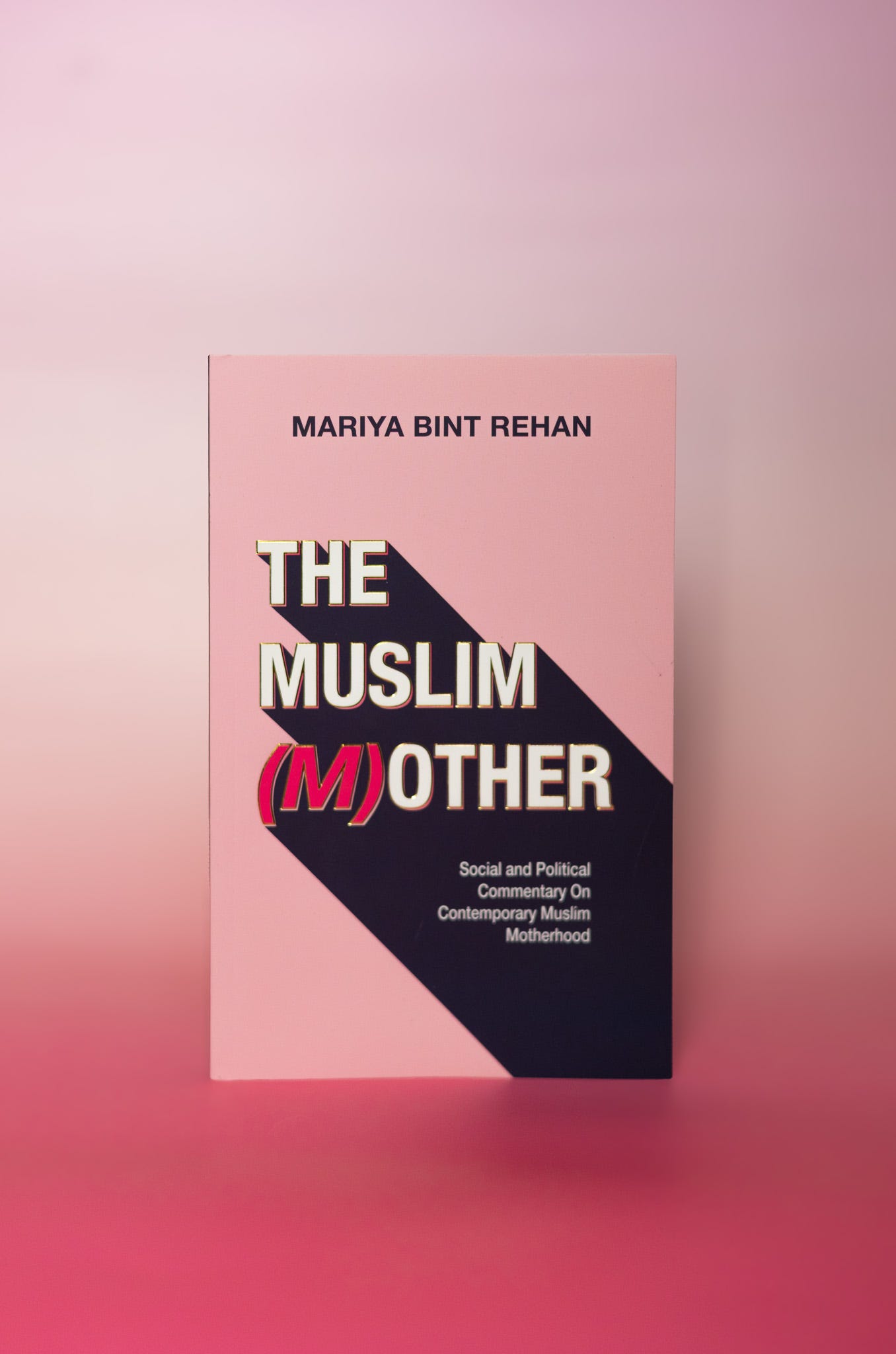I'm a woman who is TATT - Tired All The Time
How the healthcare system, government and workplace fail women with chronic pain and fatigue
Welcome back to ‘Eyb, my newsletter where I write frankly on topics that growing up as a young Arab woman I would be told are ‘eyb, or shameful, as well as issues affecting women and marginalised communities.
If you’re a new subscriber, ahlan wa sahlan - welcome - to you!
I am about two-thirds through Miranda Hart’s latest book, I Haven’t Been Entirely Honest With You, and in it she largely talks about life with chronic illness. For decades, doctors were unable to come up with a diagnosis (it later turned out Hart had M.E. as a result of contracting lyme disease as a teenager - something that many people who suffer from M.E. report to have had first before developing the condition which causes neurological symptoms, pain and bone-crushing fatigue).
In her book, Hart recalls one of her visits to her GP in which he writes down the acronym “TATT” - Tired All The Time. It seems to be a blanket term doctors use to describe what many women with chronic illnesses, diagnosed or undiagnosed, suffer from, and yet for many of us, our state healthcare systems seem really inadept at finding out the root cause for our chronic fatigue.
TATT is a lot more than being “tired” - I am talking about a constant, present and deep feeling of lethargy that makes it difficult to do something as simple as cook a 20-minute meal, vacuum the living room, or go for a walk.
There are points during the week where I will suddenly crash - my brain will feel as if it has gone into shutdown, I feel unable to keep my eyes open and my limbs will feel as heavy as lead. I have to alert my husband, who thankfully works remotely, as we have a three year old. And the poor guy has to juggle work and our son while I lie down for an hour or two.
When I lie down, I don’t fall into a blissful dreamlike state - I just seem to be in a weird light stage of sleep. I am really fortunate at the moment to be freelancing, so I mainly work from home. It does terrify me though when I think about returning to an office-based job some day.
I recently read two pieces which got me thinking about all of this again. And how the acronym TATT is actually a really rubbish description for what many women with undiagnosed chronic illnesses suffer from.
One was BBC Breakfast presenter and journalist Naga Munchetty talking about how it took 32 years for doctors to diagnose her with adenomyosis, on Stylist+ (you will also find it in the news). Another was brilliant journalist and peer of mine, diyora shadijanova writing about the debilitating pain and fatigue she is currently experiencing sans diagnosis in her latest Substack.
Both Munchetty and shadijanova point out, in this unstable social and economical climate, we are still being forced to show up to work with our pain and our fatigue and ensure that it does not affect our output. The Government has been slashing disability benefits left, right and centre, yet isn’t doing enough legislation-wise to ensure/enforce flexible working.
It’s as plain as day that in the past year, many workplaces have scrapped their hybrid working models - the last place I worked at now has my ex-teammates in five days a week. All the promises made during the pandemic that flexible working would become a permanent fixture have slowly been broken. Where does it leave people like me or shadijanova, who are able to produce high quality work but just not in an office everyday due to our fluctuating symptoms? (To find out more about how women in general are being pushed out of work, read this brilliant long-read by Ellen Scott on Stylist+)
The studies and stats are all there to explain the prevailing gender health gap and underdiagnosis of women - medical research is historically a male-dominated field with more research tending to look at how men are affected by various chronic illnesses than women, despite the fact that for many chronic illnesses, such as depression, osteoporosis, chronic fatigue syndrome and autoimmune diseases like lupus, women suffer at higher rates than men. In other words, there are lots of men doing the medical research and they don’t seem to be interested in researching how illnesses affect women, hence the lack of data and understanding.
But I don’t think we can just blame the researchers. The way women are treated, from the GP receptionists who try to block us from even obtaining an appointment, to the GPs themselves who tell us that we are “over-worrying” and to “stay off the Internet,” women are gaslit at every stage of the healthcare system and so never even manage to reach the referral stage - and you need a referral in order to be seen at a hospital in the UK and begin your process of investigation and diagnosis.
Just like Miranda, our files are probably full of terms like “tired” and “fatigue” and then decades down the line we find one doctor who actually listens, and we find out we have a condition like endometriosis, PCOS (me recently), Ehlers-Danlos Syndrome (me again, on the milder end of the spectrum) or an autoimmune disease (I’m still working on that one).
If you add race to the mix, things are even tougher for Black, Asian and ethnic minority women. Ever heard of Begum or Bibi Syndrome? It’s a real thing, where GPs and doctors dismiss South Asian women’s health concerns and stereotype them as over worrying or exaggerating their symptoms.
So, at the moment, I don’t have much faith in our healthcare systems. From what I’ve experienced and observed, they have failed us women more than they have served us.
What I’ve been writing…
I got my first feature in Vogue Arabia, interviewing viral Egyptian-American TikToker Mai Maxwell of maisvault about her recent cancer journey. Read it here and catch it in the May issue.
I did a deep-dive into the world of Islam and AI for hyphen. Can AI interpret the Qur’an? And could it become more accurate than human scholars? Take a read here.
I interviewed Tunisian singer-songwriter Emel for The New Arab about her latest album and her solidarity with Palestine. Check it out here.
What I’ve been reading…
Out this week was writer and author Mariya Bint Rehan’s new book The Muslim (M)other (Kube Publishing) which I had the pleasure of reading and reviewing for hyphen (read the full piece here). The book is a collection of essays in which Rehan looks at all the different challenges Muslim mothers face in this postmodern digital world, from growing far right movements and Islamophobia, to unattainable beauty standards, misogyny and the Red Pill movement, and annoying social media tribes like TradWives. I found myself nodding along throughout the book, and what was interesting, is much of what she writes about affects not just Muslim mothers, but all women in general, so worth a read even if you’re not a Muslim or a parent.
What I’ve been listening to…
On Spotify? Here are some of the tracks I currently have on repeat:
Ya Zarif - Nai Barghouti and Sleiman Damien
Enjoy my work? You can support me by buying a copy of my book, Hijab and Red Lipstick, which was longlisted for The Diverse Book Awards 2021 and has been featured in Vogue Arabia, Elle, Harper’s Bazaar and the BBC. Ask your local bookshop to order it in or purchase online.






